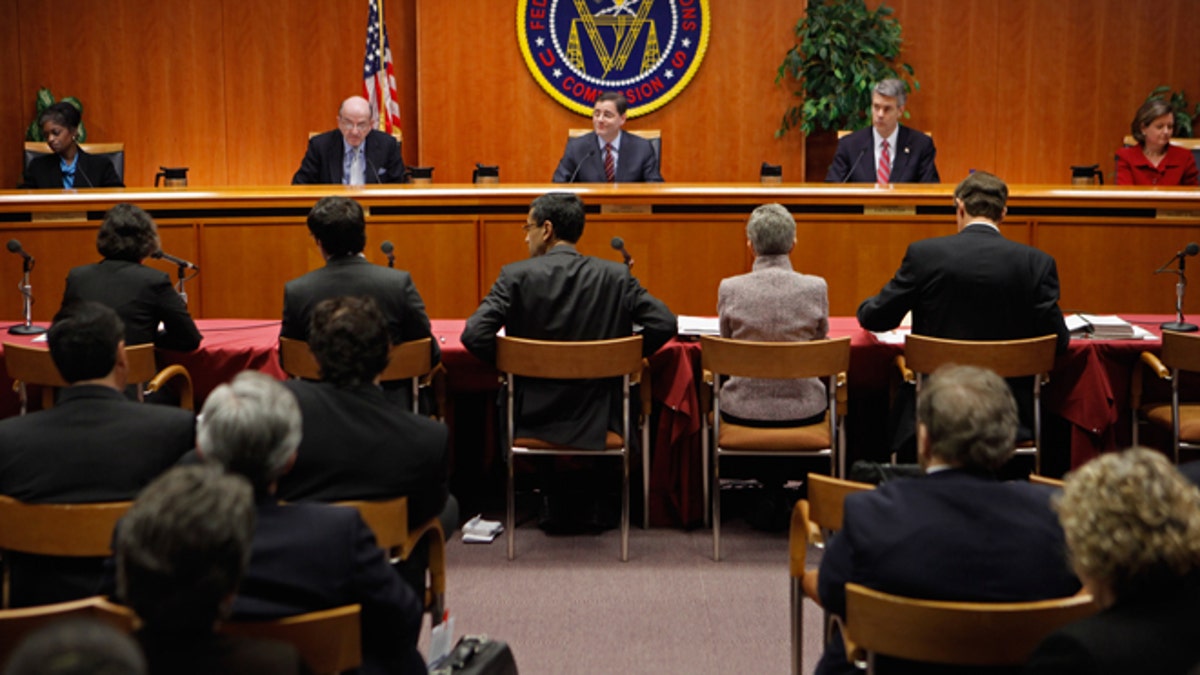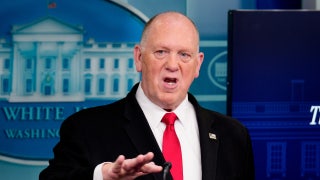
WASHINGTON, DC - DECEMBER 21: Federal Communications Commission Commissioners (L-R) Mignon Clyburn, Michael Copps, Chairman Julius Genachowski, Robert McDowell and Meredith Attwell Baker deliver opening remarks before they voted 3-2 to adopted controversial Net neutrality rules December 21, 2010 in Washington, DC. The rules put into effect by the commission create two different classes of broadband internet service -- one for fixed networks and another for wireless networks -- due to their technological differences. (Photo by Chip Somodevilla/Getty Images) *** Local Caption *** Mignon Clyburn;Michael Copps;Robert McDowell;Julius Genachowski;Meredith Attwell Baker (2010 Getty Images)
If you haven’t been following the “net neutrality” debate at the Federal Communications Commission, you might be surprised to hear the passion that has been aroused among its advocates. Amazingly, more than one million comments have been filed – from long, legal memoranda to pithy ripostes – offering the FCC advice on how it should act.
What so many don’t understand, however, is the most important impact that “Title II reclassification” (what proponents of net neutrality are advocating for) will have on the country: a more subdued economy and even slower job growth.
New rules that add substantial regulations will stall investments and reduce the number of opportunities for those who need them the most, and will be a death knell for Puerto Rico’s fragile economy.
For years, the Internet has been a relatively free and unregulated realm of our economy, leading to one of the greatest technology investment booms in our nation’s history. More than $1 trillion has been invested in infrastructure for wired and wireless Internet services over the last 15 years creating millions of jobs (including nearly one million for minorities), not to mention the billions that investors and entrepreneurs have invested in Internet companies or the additional billions that app developers have invested.
Some, however, have grown concerned that there are not enough controls over pricing, bundling, and the possibility of Internet providers charging more for prioritizing content, such as Netflix movies. Although these are reasonable concerns, “net neutrality” advocates want the FCC to go to the extreme and implement the same antiquated “Title II” regulations that apply to public utilities, when there already exist a number of other options that are less intrusive to the market.
Such over-regulation should be our greatest concern. When similar policies were implemented in Europe, investments in Internet services fell dramatically, Internet speeds slowed, and employment in the industry fell by 26 percent.
With our own stagnating economy, imagine how a new impediment to growth will affect our communities. Hispanics already suffer from unemployment rates that are 42 percent higher than the majority of the country, but are still far better off than those living in Puerto Rico, with unemployment rates idling near 15 percent. None of us can afford new regulations that will only make matters worse.
Puerto Rico stands, however, to be more greatly impacted than the rest of the country. Despite the seemingly endless economic contraction, Puerto Rico has produced a surprising number of tech startups in recent years. Contrary to most industries, technology is one of the few in which investors see the potential for high rates of return and stands to be the most impacted by the proposed change in policy.
High growth in the tech industry is nothing new for the U.S., but historically high risk and the lack of infrastructure development in Puerto Rico in recent decades makes any success an even greater surprise. Internet infrastructure development in Puerto Rico’s phone, cable, and fiber lines has been abysmal. Consider that 0.1 percent of Puerto Ricans have access to fiber-optic Internet, whereas more than 25 percent of mainland Americans do.
Yet, high demand from a voracious technology consumer market, combined with government incentives and regulatory reform have allowed for a booming wireless communications sector over the last few years. Just a few short years ago it would have been hard to find 4G phone service in San Juan, Puerto Rico’s largest city. Now, even in rural, mountainous areas of Puerto Rico, many have access to high-speed services. Intense competition from both local and national providers has also driven down average prices to levels below that on the mainland.
What does this mean for the average Puerto Rican? Not too long ago, a kid from el campo with entrepreneurial aspirations had only a shrinking, and highly unemployed consumer base; now the same kid can tap into a mobile Wi-Fi hotspot from his smartphone and start a firm like Antrocket, attracting capital from around the world and opening the door to the global marketplace.
Unfortunately, net neutrality proponents are advocating for a policy shift that initially put the brakes on Puerto Rico’s wireline infrastructure investment and continues to impair economic development today. Puerto Rico’s fledgling tech sector can’t afford more of the same regulations that has already put it years behind the rest of the country.
Why would we want to change what is clearly working and beneficial to millions of American employees and investors alike anyway? We have increasingly faster Internet service in both wired and wireless communication across the U.S. and there is more competition than ever. Ninety-seven percent of Americans currently have access to three or more Internet providers, while the U.S. has the most affordable Internet in the OECD. Puerto Rico doesn’t have the same coverage, but it has made drastic improvements, especially in wireless coverage and competition, which have stimulated new opportunities for business creation and economic development among the country’s most impoverished population of American citizens.
Opportunity, and the freedom to act on it, is what drives the American economy. That same mentality hasn’t been lost on Puerto Rico, despite its eight-year recession. Given the current state of competition, opportunities are more abundant than ever, especially for young tech-minded entrepreneurs. New rules that add substantial regulations will stall investments and reduce the number of opportunities for those who need them the most, and will be a death knell for Puerto Rico’s fragile economy.
Our communities need to continue to remind the FCC and our Congressional representatives how important it is to promote continued investment in the economy. Otherwise, there are plenty of others who may not understand the economic implications, but will be happy to speak for us.








































